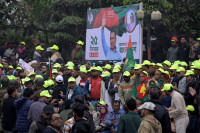Opinion
Money for nothing
The government is making a mistake by providing monetary incentive to teachers to take part in trainings
Umes Shrestha
How much money do you think the government has allocated for education this fiscal year? According to the recent budget announcement, it’s a massive Rs 86 .3 billion rupees. And most surprisingly, out of that, almost 70 percent goes for government teachers’ salaries only. This is mind boggling.
Government school teachers have a pretty good salary scale. It starts from Rs 15,940 for primary level teachers to around Rs 36,720 for secondary level teachers. Those are decent figures when compared with what teachers in most private schools get. Additionally, government school teachers get allowances, paid leaves and facilities like incentives for Teachers’ Professional Development (TPD) trainings. They enjoy a comfortable, safe and secure life, just like any other government employee.
Why train?
So here is what I don’t get: why can’t government teachers teach as effectively as their counterparts in private schools, who work for almost half of their salaries? What’s stopping most government school teachers from being effective, professional and committed to their work?
Let us take this year’s School Leaving Certificate (SLC) results as a barometer for quality education. Community schools are at the bottom with a staggering 72 percent of their students failing the exam. There are other issues too, related to the degrading quality of education, like our daft SLC examination system, lack of course books, lack of teaching materials, lack of infrastructure and so on—which are basically out of a teacher’s control. These should not, however, allow teachers to come up with 99 different excuses.
Every year, private schools produce far better results in the SLC than community schools. Is this only because private schools have good infrastructure? Is this only because of the ‘English medium of instruction’? Or is this only because they have extracurricular activities? I don’t think any of these are the case.
We know that teachers play a major role in the students’ learning success. It does not have to be about the salary, infrastructure or materials to play that role. It is about the teachers’ attitude, motivation and professional integrity. But it seems that their major motivation is just to get a ‘sarkaari jaagir’ and get settled for life. Then, most of them create a big bubble around them and when it comes to professional development, as Assistant Professor Shyam Sharma wrote on his blog, they say: “Training? I think that’s for technicians. I am already educated and I can teach.” Many stay away from training programmes and when they do attend them, they do it for the monetary incentives.
Misguided motivation
Now here is why monetary incentives for teacher training don’t work.
Presenting hard evidence from social science, American author Dan Pink (in his TED talk titled ‘The Puzzle of Motivation’) argues that incentives work well only for routine mechanistic jobs. Monetary rewards might motivate bus drivers, waiters or manual labourers but not innovators, teachers or leaders.
Pink cites an experiment conducted by Harvard economist Dan Ariely where a number of students from the Massachusetts Institute of Technology (MIT) were offered three levels of rewards according to their performance. The experimented found that “as long as the task involved only mechanical skill, bonuses worked as they would be expected: the higher the pay, the better the performance.” And interestingly, “once the task called for even rudimentary cognitive skill, a larger reward led to poorer performance.” This experiment has been replicated over and over again in different contexts and the results have always been similar.
Let’s connect this revelation with teaching. By nature, teaching is not a mechanical job. Some part of it may look mechanical (like taking attendance) but real teaching is beyond that. Real teaching requires a teacher to be creative, innovative and to possess social and cognitive skills. Which means, when you give monetary incentive to a driver, it often works, while you give incentive to a teacher it usually doesn’t.
By providing monetary incentives to teachers for attending training, the government is simply pouring money down the drain. General consensus says that most of government teachers have not been effective at all. And the government is committing a classic mistake by trying to motivate its teachers through money.
And there is one more ugly side to the government’s training programmes. Ram Abadhesh Ray, an English teacher from Birgunj, expressed disgust over a trend among government teachers to participate in trainings only when there is a ‘handsome allowance’ or if it’s in a starred-hotel with good food and drinks. And when there is less or no allowance, teachers don’t even talk about attending the training.
This is hypocrisy at its best! On the one hand, these reluctant, change-resisting teachers are only throwing dust into everyone’s eyes by using actual training as milking cows rather than professional development opportunities. On the other hand, the government is deliberately squandering the money, knowing that change is not happening.
Monetary incentives don’t work at all because if they did, government teachers would be very effective and the schools would be thriving. But the reality is quite depressing. Incentives have only made government teachers less effective, less creative and probably, very selfish.
There are tons of literature and reports which claim that the TPD programme hasn’t been effective at all. Even the Ministry of Education’s National Centre for Educational Development (NCED) acknowledges this fact on its website. Therefore, the government should immediately cut down all incentives, especially allowances, for TPD programmes.
Pay for trainings
Here is what I believe the government should do. Trainings should not be mandatory at all. There’s a saying—you can drag a horse to water but you can’t make it drink. Adults are like that. Social science tells us that adults do not learn or change unless they want to. Therefore, the trainings should be voluntary while an institutional policy should be drafted to favour those trained teachers for promotions and raises.
The government should make its teachers pay for the trainings, because if the teachers invest in training, they might take it seriously. This idea sounds blasphemous but that’s the only way to make teachers assume ownership of their training. As a result, they will develop ethics, integrity and responsibility.
Next, the government should invest in ‘follow up’ programmes to bridge the gap between training and classroom teaching. A trainee teacher, for instance, should also submit an implementation report to the ministry within three months. Even better, teachers and school districts should compete for government funding with which they can organise professional development events. Such funding should be based on the progress report submitted by teachers and experts from local education offices, along with student evaluations.
If rewards should be given, they should be for producing results, such as a higher pass percentage in SLC and other forms of evaluation. Only then may government teachers discover deep intrinsic motivations to get out of their rut, find a purpose and stretch their wings towards professionalism. Intrinsic motivation is key. Maybe, the teachers will then transfer some part of their training to the classroom and government education can become a little more effective.
Shrestha is a full time English language teacher at a secondary school and also teaches part-time at a management college




 7.12°C Kathmandu
7.12°C Kathmandu










%20(1).jpg&w=300&height=200)

